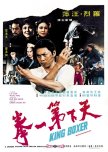
Lo Lieh plays the earnest competitor who gains the confidence of his kung fu master and is taught the secret iron palm technique.
Along the way there are betrayals, decapitations, eyes gouged out, and a little romance.
The fights felt a little overly staged at times but were entertaining nonetheless and Lo Lieh is always a smoldering delight to watch. It’s worth watching to see the iconic shot of Lo’s glowing red hands.
Though the plot was thin it never got in the way of some good kung fu fighting. And that’s primarily what I watch these movies for. It also paved the way for another kung fu fighter who would set the bar higher later that year-Bruce Lee.
Esta resenha foi útil para você?
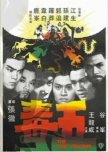
The Five Venoms begins with a mystery that a young ku fighter must resolve for his dying master and the audience watches the story unfold as he does. He must figure out the deadly players involved with little information and also who is using their venom training for selfish motives. There are alliances and betrayals, hidden identities, a secret treasure and real stakes.
The five members of the poison clan each have their own fighting style-scorpion, snake, centipede, lizard/gecko, and toad. The different fighting styles are fun to watch and give a glimpse into the characters’ personalities. Unlike many kung fu movies there is some character development and motivations for their behaviors.
What I didn’t care for as much is that the fights looked too choreographed. I didn’t feel like they flowed smoothly at times, more like dancers counting their steps. At least they kept the camera still and at a distance where the whole scene could be observed instead of just seeing segments of the fight. I have to say I like to have at least one female fighter in the cast, sadly there are almost no women in this movie. I think I saw Mama Hung slumped over where an entire family had been murdered when one of the bad guys was trying to find the treasure map. Little quibbles are I could see the wig tape at times, and the fight sounds were not always synched with the motions. I try not to judge a kung fu movie by what are usually atrocious dubbing choices, but at least it didn’t sound like one guy was doing all the voices.
The Five Venoms and teen sidekick was an entertaining movie. The good guys eventually team up against the bad guys showing that teamwork does pay and evil does not. Like all kung fu movies I’m kinder in grading it, as it was a product of it’s time and for a specific audience.
Esta resenha foi útil para você?

Yoon Gyun Sang was cute as the mostly clueless helper. I enjoyed the different guests they had visit. Some were better in the "kitchen" than others.
Now to what didn't work as well for me. I thought the episodes were too long. An hour would have been enough time for me. There was an awful lot of filler. If I never see someone scooping up goat dung again it will be too soon. A lot of time was spent taking care of the goats, traveling, watching the cats frolic, and watching the guys fishing or playing out on the water. There were other times when practical jokes went on for nearly 20 minutes. There were also episodes where there wasn't any scintillating conversation taking place, just a lot of standing or sitting around with little conversation. These guys have been in the business for awhile and must have some interesting stories to tell. I wish they had opened up more and told us some. There was one conversation with Lee Jong Suk that that I thought was revealing but those moments were brief. If it wasn't for the pop-ups this show might not have been as entertaining. I could have also used less dirty bare feet close-ups when someone was preparing food on the floor.
Had it not been for all the filler moments that completely lost my attention I would have rated this variety show an 8.0 or 8.5 The cooking aspect of this show inspires me to look at food and flavor combinations in a new way. Spoiler! Although for a Pizza Margherita I'm still putting the basil on as it comes out of the oven so that the basil doesn't scorch like theirs did by putting it on before baking.
I can definitely recommend this show for the cooking scenes, they were very interesting. And if you like to watch goats doing goat things or cats trying to escape their room this may be just the ticket for you.
Esta resenha foi útil para você?

Esta resenha pode conter spoilers
This drama started out as a steamy, temperature rising story of a good girl tempted by the wild side in the form of the gorgeous, sexy Jasper Liu. Waiting for a new episode each week to be English subbed was interminable. Then the writers slammed on the brakes and morphed the story into an office drama dousing everyone in an ice cold shower. Maybe they got cold feet about besmirching the FL and ML and making them look like cheaters.
By the time the abbreviated who gives a fork third act came around I’d already queued up An Affair with Lee Mi Sook and Lee Jung Jae to show those young whipper snappers what it could have been.
Even though I found the whiplash inducing change of tone frustrating in this drama I still dutifully waited and watched every week. My disappointment is over what could have been and wasting Jasper Lui on what ended up being a boring office drama for the most part.
The leads did a good job. I even enjoyed the best friend’s over the top acting and story.
The music was ok, but not memorable.
Rewatch value-I’ll probably go back and watch parts of it sometime in the future.
I would definitely not discourage anyone from watching this, just don’t have any expectations of where the story is going based on the first few episodes and intro. Enjoy it for the flawed story it is.
Esta resenha foi útil para você?
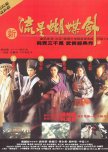
Uneven story with wildly over-the-top wuxia action
Butterfly and Sword was a bloody, high flying, star-studded, overly complex, mess of a movie. And entertaining in a way only an over-the-top wuxia starring Michelle Yeoh, Donnie Yen, and Tony Leung Chiu Wai could be.What was it about? Good question. I've watched it twice and it still has confusing elements. Every synopsis I read had a slightly different take on it. Lady Ko, Meng Sing Wan, and Yip Cheung have been together since they were street kids doing what they had to do to survive. All grown up, the three are assassins who often take well paid jobs from the eunuch. Lady Ko is the boss, motivated by gold and power. Sing is lovers with Butterfly, the daughter of a martial artist killed in battle. Sing pretends to not know any martial arts, telling her he has to go on business trips every once in a while. Yip also works for Ko and spends his spare time peeping on her when she’s bathing. It’s not really a love triangle, this is more like a love conga line. Yip loves Ko, Ko loves Sing, and Sing love Butterfly. When the eunuch sends Ko and her Happy Forest to take down the Elites Villa and retrieve a letter listing rebels, the blood begins to spew and body parts start flying.
Michelle Yeoh gave a nuanced performance of a deadly assassin who grieved her lost childhood and love. I wasn’t crazy about the jealousy trope for a strong woman, but she made it work. Donnie Yen was the love sick puppy lacking the courage to tell Ko he’d loved her since they were children. Tony Leung gave a lighthearted take on the assassin in love. I’m not familiar with Joey Wong, but her Butterfly was annoying. Despite all the strategizing, spying, betrayals, and gruesome fights, the story came to a screeching halt every time Butterfly came on screen.
The fight choreography was wildly excessive. Sing was able to launch himself like an arrow from a line in a tree or Ko’s body. Was the craziest technique I’ve seen in a wuxia, especially when he blew through people’s bodies. Nothing could withstand the characters’ abilities, not even buildings. Donnie and Michelle had a great fight scene in a bamboo forest that left most of their opponents skewered. It also showcased Michelle’s flexibility. Even though there were numerous gruesome decapitations by a variety of methods, they were fake enough to be more humorous than terrifying. There was even lethal soccer action! If you don’t like wire-fu, skip this one. Most scenes used wires and sped up action. Tony Ching put his imagination to good use developing the maniacal fight choreography.
Butterfly and Sword was not a great movie, but it was fun. The story was maddeningly disjointed and edited. Fortunately, Michelle Yeoh, Donnie Yen, and Tony Leung were in their prime and held nothing back. When scenes cut abruptly into a different one or the reason behind certain actions weren’t explained, it helped to keep an eye on the stars. This is a movie for fans of the genre and who don’t mind a film that isn’t polished and doesn’t take itself too seriously.
11 March 2024
Esta resenha foi útil para você?
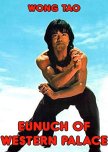
"You look too stupid"
Eunuch of the Western Palace trotted out the evil eunuchs complete with a secret letter everyone wanted to get their hands on. Don Wong, Meng Fei, and Doris Lung starred as the sword carrying rebels determined to rid the country of corruption. Wu Ma wrote and directed the film from 1979.Don Wong is given a letter by a dying rebel. Lo Lieh saves his life, but refuses to become allies. Don meets up with Meng Fei, Doris Lung, and an unknown Taiwanese actress called the Invincible Sword. The rebels split up and are hunted by the eunuch’s men, including Lung Fei. Yuen Shen plays one of the leaders with knowledge of the eunuch’s wrongdoings who is trying to get the information to the emperor.
There was a lot of bouncing back and forth and circling around with the narrative which didn’t make much sense except to kill time. The much sought after letter faded in importance as the movie went along. The fights were about average for the time though a couple of them were filmed at night which made it almost impossible to make out the action. Time has not been kind to this movie with many frames darkened and/or blue in places.
The biggest reason to watch this film is if you are a fan of the cast or just enjoy old kung fu movies. I’ll watch about anything with Lo Lieh in it. He played the Doc Holliday style character with TB and a sense of honor. Don Wong, though stuck with a wig that looked like it had been run over by a carriage, held the rebel cast together with his presence. Doris Lung seemed to be having fun as a competent fighter with a wicked sense of humor. Meng Fei’s rebel was rather bland and dense. Tsung Hua chewed up the scenery as the power-hungry eunuch and Lung Fei could always be counted on as a believable baddie.
Eunuch of the Western Palace didn’t break any new ground in the evil eunuch genre or feature spectacular fights. It was watchable if you like any of the actors and the final fight in a snowstorm wasn’t bad. As always, I grade these old, low budget niche films on a curve.
3 July 2024
Esta resenha foi útil para você?

Esta resenha pode conter spoilers
"There's more to life than ambition"
Gappa: The Triphibian Monster had a couple of unique things going for it but mostly it was a re-work of other, better Kaiju films. Humans had to re-learn the most basic lesson of nature---never approach or steal a baby animal as you will have to deal with the wrath of the mother.A publishing CEO has decided to build Playmate Land (Hugh Hefner's use of that word has ruined it for me), a jungle paradise and experience with exotic animals. He sends a reporter, a news photographer, and a scientist to a remote island to see if there are any new species that could be brought to the attraction. The team is greeted by a primitive tribe, some unfortunately in black face. After a statue is destroyed during an earthquake a cave is revealed. Kurosaki and Koyangi discover a large egg that hatches. Tanooka, the researcher, along with Kurosaki decide to take the creature back to Japan even with the tribe begging them not to for it will make Gappa angry. No sooner have the men handed the creature over to the CEO than Big Daddy Gappa and Big Mama Gappa begin to wreak havoc in Japan searching for their offspring.
This was a lesson in the consequences of reckless ambition and greed. When Koyangi begs Kurosaki to return the baby Gappa to its parents he gives her the ‘men have to do what men have to do because we are men’ speech. She looks at him like he’s an idiot and wondering why she’d ever fancied him. Even after Kurosaki and Tanooka come to their senses the CEO refuses to accept his losses and to take responsibility for the epic disaster. While the men come to the conclusion that there is more to life than ambition and other people are important, too, Koyangi’s decision at the end to come to her senses and accept she’s an ordinary woman and needs to get married and wash diapers was eye-rollingly sexist.
The miniatures were about average for this timeframe. Despite the fact that the Gappas could fly, walk, and even breathe under water (where the Triphibian comes from) they were terribly static. They lethargically and quietly lumbered through the cities, unable to move their arms and bodies much. Other than Mothra when her besties were kidnapped and she went on a rampage to have them returned, the Gappas had the strongest motivation for destroying the humans. Even with that compelling motivation they came across as soulless. This is the first Kaiju film I’ve seen with a nuclear family and one that was anthropomorphic which should have felt more heartwarming. Small children might be more moved by it.
Gappa: The Triphibian Monster was actually a loving family of Gappas who weren’t afraid to tear down Japan to protect their own. If they’d had more mobile costumes and the film had better direction, this movie would have been raised to a higher tier in Monsterdom. As it was, Gappa didn’t lay an egg, but it didn’t soar either.
10/10/23
Esta resenha foi útil para você?

Esta resenha pode conter spoilers
"You are death!"
Maria tread over familiar revenge movie ground, not adding anything particularly innovative. For those who watch action and martial arts films such as Kill Bill, The Villainous, or La Femme Nikita you'll be able to call out what will happen next with little difficulty. Still, I did find this film entertaining even if it didn't offer anything new to the genre.Lily/Maria had been a trained assassin working for Kaleb and the De La Vegas crime family. After she refused to kill two innocents, she faked her death and "retired". A few years later she's enjoying her life with a husband and daughter. Kaleb discovers she's still alive when he's tasked to kill an incorruptible governor. He's in a Cain and Abel relationship with another killer working for the family who wants his spot in the hierarchy. A standard revenge trope later and Maria is on a rampage. I truly wish writers would be more innovative when writing for women assassins, most of these movies are incredibly similar and use the same tired paradigm set decades ago.
The movie utilized Filipino martial arts and knife fighting as well as plenty of gun action. The fights were well choreographed but not extraordinary. What I liked about the various confrontations was that there were few extended fights with any rival, Maria competently took out the bad guys in a precise and efficient manner.
For those who are squeamish, there were several gruesome torture scenes and plenty of blood spurting with the fights. Despite the provocative poster there was no nudity only one shower scene where no bits and parts were on display.
Christine Reyes was credible as both the happy homemaker making sure everyone ate a healthy breakfast and the cool, calculating assassin. The rest of the cast were capable, but not memorable. For the most part, Maria wore sensible rampage clothes. Often directors dress female assassins provocatively to lure or appease male viewers. There was a club scene where she wore a sexy dress and ridiculously high heels. The actress seemed to have trouble walking on the thin heels, I would have broken an ankle. I was pleased that she went back to pants and sensible shoes for kicking and chasing down her enemies. The crime family's female assassins were more scantily clothed. Win some, lose some. Lastly, the score was properly edgy for all the death and mayhem.
I've watched several Filipino films, and Maria had the best production values of the lot. There was a nice use of color and light. The fight scenes didn't seem to have a high budget, but it didn't appear cheaply made either.
While the movie was predictable, Maria was a worthy assassin to add to the female cadre of action "heroes". Also, it was nice to see a Filipino film embracing the world of badass female leads. Next time maybe they can be the one to break the mold that most countries are content to use repeatedly.
4/15/23
Esta resenha foi útil para você?
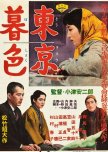
Esta resenha pode conter spoilers
"I want to start over"
Tokyo Twilight is a film about a disintegrating family and the darkest film I've seen by Director Ozu. The darkest and the most difficult for me to come to grips with. This last of his films in black and white was gorgeous to look at, one of his most aesthetic in regards to framing and composition. But I come back to the subject matter. Do I rate and view it as the audience it was intended for? Or do I rate it as a 21st century woman who was appalled by aspects of the story? I ended up splitting the difference.Takako and her young daughter have moved back in with her father, Sugiyama Shukichi, though he doesn't know she's seeing it as a permanent situation. After pulling the information out of her, she confirms what he's been hearing. That the good Professor Numata she's married to has been drinking heavily. He is also abusive to Takako, but especially her daughter when things have not gone his way at work. Numata's admitted to having no paternal love toward his child.
Akima is the younger sister. She's carrying a secret within her and desperately trying to find her college boyfriend who put it there. With no mother to confide in and not close enough to her sister to share, she bears the burden alone. She stays out late at night and because of this is repeatedly described by men as decadent and wild. Waiting at a café where her boyfriend, Kenji, told he'd meet her she is taken to a police station by a police officer because she shouldn't be out late alone. The place was a known hook up joint for prostitutes, and with Kenji never showing up, it looked like a cruel joke was played on her. Ultimately, she decides to rid herself of her secret since her boyfriend has mostly rid himself of her. Later her aunt tries to play matchmaker, with Akima crying forlornly that she will never marry or have a child.
Shukichi is proper and polite to everyone but also an authoritarian father. He's ready to cut Akima off because he found out she'd been taken to the police station but Takako steps in and soothes his anger. Years earlier Takako would have married someone she'd cared for if Shukichi hadn't insisted she marry Numata instead. His word is the law in their household.
If all this wasn't enough drama, the missing mother shows up in a mahjong parlor Akima and Kenji's friends frequent. No secret stays buried and soon the daughters find out she's back and why she left. Akima fears she has her mother's bad blood and will never be happy or that she was illegitimate. Takako cannot forgive her mother for abandoning them and holds her responsible for Akima's problems. The mother was an enigma, she wanted to reconnect with her daughters but when she found out that her son had died several years earlier, she did so without so much as batting an eye.
Takako and Akima both wish to start over and find happiness. In the end, neither do. Akima suffers a horrible narrative fate to punish her for becoming too modern and breaking familial tradition and traditional female roles. Takako fears her daughter will end up like Akima if she doesn't have both parents raising her and decides to return to her husband. When she informs Shukichi he nods his head and says she'll be successful this time if she tries. Takako looks like a woman heading to the guillotine, painfully aware happiness is not in hers or her daughter's future. After Takako moves out the maid helps Shukichi get ready for work, the birds are singing, the sun is shining and the swelling music tells you this is a happy ending. Maybe for Shukichi it is, but not for his children. Somehow this father remains blithely unaware of his unhappy role in the dissolution of his marriage and the sorrows of his children.
As I mentioned, the framing and shots were among some of my favorite. Ozu's use of light and shadow relegated some scenes to true artwork. Mostly, the score was pleasant enough though the music's bright tone during a tragic time seemed out of place. Ryu, an Ozu regular, did well as the quiet authoritarian father. While this may have been my favorite Hara Setsuko performance thus far, she showed a variety of emotions instead of smiling most of the time, it was distracting knowing that she was only 3 years younger than her "mother" in real life. Arima Ineko was called upon to show a complex array of emotions as she dealt with her family, her irresponsible and selfish boyfriend, and sitting alone making decisions beyond her years and succeeded. The acting though often subdued as it is in Ozu's films felt more thoroughly rounded than usual. All of the characters felt like real people. Ozu's insistence on some characters staring directly into the camera while saying their lines is still a detracting custom for me.
The whole thrust of this story came down to the idea that the family was destroyed because the mother found love while the husband was stationed in Seoul and left upon his return. The daughters didn't have a proper female presence which ended up corrupting Akima. A father's love could not make up for that, even though Takako did not go off the rails. Akima had sexual relations with the boy she loved and was punished in every way for it while he escaped with no repercussions. If the doors of propriety could have been cracked opened for real communication, she might have been able to talk with her father or sister to seek support and help her make the decisions she needed to make. Takada was chained to a man who didn't love her or their child and was abusive. She returned to him because it was the "right" thing to do. And her father simply smiled benignly instead of seeing the fear in his daughter's eyes and supporting her. I know Ozu had a father who was often gone, working in another city, but somehow he missed how a vicious drunk and emotionally vacant father can scar a child forever even more so than an absent one.
This was not a story of reconciliation or redemption, but of punishment and retribution all tied up in a polite, proper bow. Each of the female characters were left in pain and an uncertain future with no chance to start over. The men all went about their happy way. I can usually either follow Ozu's train of thought or make excuses for him, but not this time. Even though his viewpoint was a common one in the 1950's, I was appalled at his treatment of women in the name of tradition and family unity.
2/20/23
Esta resenha foi útil para você?
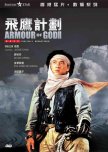
Armour of God II: Operation Condor
0 pessoas acharam esta resenha útil
Esta resenha pode conter spoilers
Sometimes it's better to travel alone
Jackie Chan had a big budget to make a sequel of sorts to Armour of God in Operation Condor. He once again plays Asian Hawk, simply referred to as Jackie, this time hunting Nazi gold in north Africa.The movie opened with one of the most spectacular motorcycle and car chases I've ever seen. One stunt in particular was death defying enough that Jackie shows the scene three times from slightly differently angles just to make sure we appreciate it. Near the end of the chase, he repeats the viewing for another ambitious stunt. I was ready to sit back and be entertained by this high velocity ball of energy. Instead the movie came to a screeching halt when Carol "Do Do" Cheng's character was introduced. The stereotypical "know it all" female control freak was to accompany Jackie and be in charge of him on his trip to find the Nazi gold. As if one annoying female character wasn't enough, Condor adds another. This time the granddaughter of one of the Nazis who was in charge of the treasure base will also be making the trip. Later, they would add another useless female character. They all had the ability to do exactly the wrong thing at the right time to make everything worse. I'm also pretty sure they must have been paid per scream. There was a lot of screaming and needing to be rescued. If this is your idea of humor you are in for a real treat. For me, it made the center portion of this film interminable. To make matters worse, the fights in the middle portion of the film were scarce and uninspired.
The final segment of the film picked up. The female characters still managed to behave absurdly, but at least the stunts were better. Jackie had to fight two foes in a giant wind tunnel for testing planes. Here at least was some inspired action and humor involving Jackie and his fighting style.
There were also some questionable representations of other cultures. The 1990's might not have been the most sensitive time, but I found the portrayals offensive. Even more offensive was the idiotic portrayal of every female character. I finally had to mute the TV during some of the scenes to be spared the screaming and the "save me Jackie!" cries.
This is a highly popular Jackie Chan film, especially from many people's childhood memories. Unfortunately, that was not my experience. The beginning of the film and the end were stunt triumphs. The cringeworthy middle left me wishing the bad guys had been better shots. This was Operation Turkey* for me.
*turkey is not only a bird, but American slang for a dud
2/5/23
Esta resenha foi útil para você?
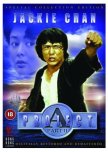
Esta resenha pode conter spoilers
Fate is on my side!
Jackie Chan's Dragon Ma is back for this sequel to Project A without Sammo Hung. He has to face not only the criminal Tiger Au, but vengeful pirates, rebels, and most of all a corrupt police officer who wants him dead. Dragon has his hands full and sometimes handcuffed all while trying to navigate the conspiracies and death threats. This is vintage Jackie Chan with plenty of hard- hitting fists, kicks, falls, and laughs.The plot is fast moving as Jackie has to take down the criminal element, deal with rebels and their secret book of names, avoid being killed by his superior, and escape the pirates' flying hatchets sometimes all at once! The story has weak areas as the double crosses and changing alliances take place, but the action is non-stop and the main reason for watching the movie to begin with.
One of the funniest scenes takes place in Maggie Cheung's home as a stream of good guys and bad guys revolve around her household searching for places to hide, often unaware of the others. Another inspired bit has Jackie and his nemesis Chun handcuffed together as a hatchet wielding gang(plank?) of pirates chases them through town.
The stunts often end with someone hitting the ground hard or smacking into a giant vase or poles on the way down. In one of the last scenes, Jackie runs down a falling wall and afterwards the building façade lands on him with little room for error to avoid a calamitous injury. This film is full of some of the most inventive fight and stunt scenes you are likely to see. Though the final fight scenes are long there is so much variety with Chan and different fighters and stunt elements it would have been hard to be bored.
Chan avoided the obvious mugging from some of his later movies and was a joy to watch as he ran up and down walls, cleverly finding ways to escape perilous situations. The cast was solid. Rosamunde Kwan appeared as a rebel. Michael Chan provided a great foil for Jackie in one of the early fights. And Lam Wai as the corrupt Superintendent Chun managed to keep up with Chan while they ran, flipped, and fought handcuffed together in a memorable sequence. My only disappointment was with Maggie Cheung's dipsy doodle role. She's so much better than the idiotic female she was often asked to play in Chan's movies.
The spectacular stunts and fights made up for a less than compelling story. This film was when Jackie Chan was starting to hit his stride as a choreographer, director, and star. Other films might have had more dangerous stunts but Project A 2 had plenty to keep your attention.
2/5/23
Esta resenha foi útil para você?
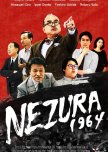
Esta resenha pode conter spoilers
An under-rat-ed making of a failed Kaiju mockumentary
(Warning! Rat puns ahead!)Director Yokokawa returned to the mockumentary by giving Kaiju fans an imagined look into the making and scrapping of the 1964 film Giant Horde Beast Nezura. Yokokawa displayed his devotion for the genre and once again made sure that a bit of Tokusatsu history was not forgotten. Before there was Gamera, Daiei began production on their vision of a giant monster to compete with Toho-a horde of rats! This short film showed an enor-mouse amount of love on a tiny budget for the forgotten terrors.
The movie was largely in black and white as if the filming was done in 1963. The film starts with the executives brainstorming ideas for their next big hit. Feeling that their competitor (ahem, Toho’s Godzilla) had grown stale they sought out a new monster to fill the void. After watching Alfred Hitchcock’s Birds and being inspired to use a more common animal, the vile enemy was agreed upon…rats. They also decided to use real rats for filming with their miniature sets. The “documentary” takes us through the miniature set making, the model creator, and the crew trying to make the rats more menacing. Ultimately, they took a truck up and down the streets offering to pay 50 yen for every rat given to them. The street rats were much more active. Unfortunately, they were also carrying fleas and disease. The powers rat be at the Bureau of Public Health upon hearing complaints from nearby residents shut them down. In real life and alluded to in the film, the rats were doused in oil and set on fire to dispose of them more humanely. I doubt the rats thought it was that painless.
I’m not sure who thought rats were a great idea for a film, they are notoriously difficult to work with. Everyone has heard the horror stories of how demanding Jerry was while Tom was a real pussycat to get along with (ancient Tom and Jerry cartoon reference). Jokes aside, because of the difficulties the movie was abandoned after only 3000 ft were shot. This mockumentary did not use any of it, if any footage is still in existence, nor any photo stills. The model for the super giant rat was tusked and frightening. It’s no sec-rat that if they’d stuck with just a guy in a rubber suit and not used disease carrying rodents, the film would have been completed.
Yokokawa gave Nezura the star treatment with a mice little theme song, a jaunty number, sung by Gamera Super Monster’s lead female alien (Fumiake Mach)! Once again Yokokawa preserved a Kaiju from complete obscurity and did so with much respect. The Great Buddha Arrival was more ambitious than this project but his passion for his subjects comes through on the screen, even when using people with little or no acting skill and a miniscule budget. I found the behind the scenes making of the miniatures worthwhile and the filming of rampaging rats interesting even when they were hilariously just sitting around licking themselves.
Though Nezura was canceled before he came to movie life, in his wake, a guardian awoke-Gamera the Invincible in 1965. Gamera would go on to become the guardian of little children. Hindsight says a turtle ended up being a safer choice than a horrifying rat. Gamera squeaked away with the win!
For Kaiju enthusiasts this is an entertaining short film to check out, to see what might have been. There’s nothing earth shattering or rat-ical about it, simply an hour to support one man’s passion for our beloved Kaiju. Sorry for the puns, I was just trying to a-mouse myself.
1/27/23
Esta resenha foi útil para você?
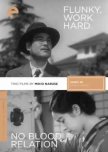
Esta resenha pode conter spoilers
Naruse's earliest surviving film packs a lot of heart into a short amount of time
Flunky, Work Hard aka Little Man, Do Your Best is the earliest surviving Naruse Mikio film. The film clocks in under 30 minutes but manages to pack a lot of story into the short amount of time. Comedy and tragedy are both on display in this 1930’s rural Japan slice of life film.Okabe is a life insurance salesman with few prospects, doing the best he can to support his family. We know the family is struggling when he attempts to repair his shoe in an early scene with newspaper. Their hut lies near sewer pipes and in a foreshadowing move, the railroad. The wife may voice her displeasure at their financial circumstances but she works hard and deals with disgruntled neighbors and the landlord while meek Okabe hides. His precocious son, Susumu, keeps running afoul of the local wealthier kids. Susumu dishes it out as good as he takes it, making a name for himself. Okabe, meanwhile, is willing to demean himself in order to make a sale, even allowing kids to play leapfrog with him in an effort to win over the mother. In a pivotal moment, he argues with Susumu after his son has fought a potential client’s child, leading to dire consequences. Okabe’s desire has been to provide for his family and he wants to buy his son a toy plane. In the end, his efforts may have come to naught when he realizes what his actions have caused.
I know Naruse primarily through his films centering on a strong woman doing what needs to be done for herself or her family. In this film, he focuses on a father who loses sight of what was important while trying to make a living during the Depression. Though short, the film was entertaining. Naruse used a variety of camera effects to convey characters’ emotions. The version I watched had no music but I’ve come to accept this with these much older films along with the degraded film quality. The story was straightforward enough that the placards were hardly necessary but the few in the film were effective. Naruse gave us an insight into 1930’s rural Japan with this small family that has managed to survive the years. Though the ending may have been heavy handed, comedy, tragedy, and irony, all played their roles in this heartwarming film focusing on a struggling father and his love for his son.
1/26/23
Esta resenha foi útil para você?
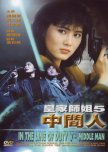
Esta resenha pode conter spoilers
Lots of high flying kicks not encumbered by a coherent plot!
Cynthia Khan returns to the In the Line of Duty franchise for Middle Man. This 1990 film feels more like an 1980’s Hong Kong martial arts movie. Lots of fighting, very little plot.Cynthia is joined by David Wu in this convoluted story that goes from Hong Kong to Korea. It involves the US military, CIA, HK police, and an underground information spy ring. Wu’s David is accused of spying and the race is on to see who can kill him first. He has to drag around the dumbest girlfriend ever for awhile until the writers mercifully divest him of her. Khan’s Inspector Yang Li Ching helps her cousin elude the murderous gang, CIA, and police so that they can hunt down The General and collect evidence to clear David. David is not the smartest seaman on leave making Inspector Yang’s job even tougher trying to keep him alive.
The thin plot only served to grant space for the fights, lots and lots of fights. Most of them were well choreographed with a minimum of wire-fu and cranking. Khan was quite proficient and believable as she athletically ran, kicked, leapt, slid, and even dangled off of buildings and ropes. She lacked some of the onscreen personality of say Michelle Yeoh, but was likeable enough in this role. Wu was adequate but not terribly charismatic. Lo Lieh, at nearly 60, showed up as the gentle godfather who still had a few moves left. A nice surprise was Australian Kim Penn, a real-life martial artist and member of the Hong Kong Stuntman Association who made a beautiful foil for Khan as they had one of the bloodiest girl on girl fights I’ve seen in some time.
Middle Man was an entertaining martial arts movie if you don’t pay attention to the plot and just enjoy the fight choreography. It’s rare that a female lead is allowed to carry a gun toting, fists and kicks movie, so I bumped it up a bit in my rating.
1/25/23
Esta resenha foi útil para você?
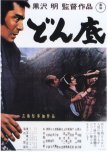
Esta resenha pode conter spoilers
"You'll learn to love me, the lessons are free." Don't bet on it.
The Lower Depths refers to a group of impoverished tenants living in a building that is propped up with beams and the cliff it leans against. It’s a dark comedy about people who have no hope for tomorrow, living close to the edge of death and pennilessness.The film is based on the Russian playwright Maxim Gorky’s 1902 play. Most of the film is set inside the dilapidated tenement as if it were a play with characters walking on and off stage. The technique can make for a claustrophobic experience as if you were trapped in the room with straw covered floors and unlikeable characters and like them have no means of escape.
The film is one long unending conversation between the different characters. They spend their time complaining about their lot in life and complaining and gossiping about each other. There’s a tinker, a prostitute, a husband and wife, a thief, a cheating gambler, and an alcoholic cohabitating in the great room with bunk beds. Their usual tirades are broken up by the appearance of an older man, nicknamed Grandpa, who brings a bit of wisdom and compassion to the bickering group.
This was my least favorite Kurosawa by far. I didn't find any of the characters or performances particularly compelling. Even the charismatic Mifune Toshiro struggled to bring the thief having an affair with the landlord’s wife to life. The characters complained about their lives incessantly, but even when Grandpa tried to tell them there might be something better away from the toxic environment none of them took a chance to make the move. Only one did and it ended in utter disaster. Kurosawa at least got his consistent view of women out of the way in the first scene by having a character state that all women are liars.
There is much discussion about when telling the truth is bad and telling a lie is good. The benefits and downfalls of money is also discussed. “Money buys your fate in hell.” “Human kindness can’t be bought with pennies or silver.”
I suppose I need more white space, and this film had too many words crammed together from beginning to end with scarcely a breath or compelling action taken between them. Acts of compassion were few and far between causing the characters to not resonate with me. This room full of characters failed to enlighten me on the social plight of the poor, the failings of the state, or how people even in dire situations look out for each other. Though there were moments of almost grudging kindness there weren’t any likeable characters, with the possible exception of Grandpa. Truly by the last moments of the film with its extremely abrupt ending, I wasn’t sure what I was to take away from this story other than a window into a deeply flawed group of impoverished people trying to get through the day knowing that when tomorrow comes it will not be any better.
If you are interested in watching a Kurosawa film, this is not the one to start with. If you are a Kurosawa fan, this is a must see, as it differs from the films preceding it and is worth a look.
1/6/23
Esta resenha foi útil para você?

 55
55 202
202 11
11






















